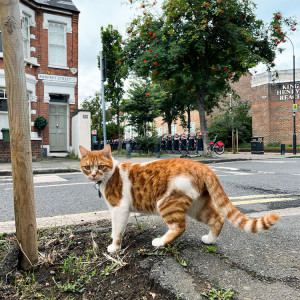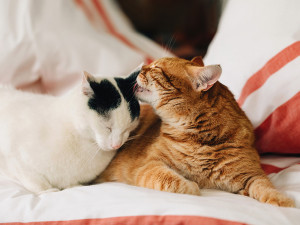Is Your Outdoor Cat a Legal Liability?
The lowdown on feline misbehaviour

Share Article
Your cat’s out there living their best life – and around two-thirds of cats in the UK have access to both the indoors and the outdoors. But when they get up to mischief, are you the one who has to face the music?
Of course, if you have an outdoor cat, you can’t keep an eye on them all the time they’re outside. And your cat might get up to mischief, be it sneaking into a neighbour’s house through the cat flap, fighting another local feline or catching wildlife.
We’ve all seen news stories about badly-behaved or mischievous cats. One cat in Norfolk was caught red-handed last year after his family found a stash of cat food pouchesopens in new tab he’d stolen, while one person even complained that their neighbour’s cat was sitting on a garden tableopens in new tab. More seriously, one cat parent asked Reddit for advice a few years ago after their cat killed their neighbour’s pet rabbitopens in new tab.
While these antics might make headlines, they also raise a serious question: when does mischief become your legal problem? If your cat does cause damage – be it to a property, a person or an animal – can you be held legally responsible? And what actually is your responsibility as someone who owns a cat? Here, we’ve taken a look to offer some much-needed clarity.
What’s my legal responsibility?
Here’s the thing: UK law gives cats more freedom than dogs because, let’s face it, they’re less likely to cause damage to property and injury to people. “The laws regarding cats are a bit different to those associated with dogs and livestock,” says Dr Anna Foreman, in-house vet at Everypaw Pet Insuranceopens in new tab. “As cats are less likely to cause damage to property and cause injury to people, cat owners are not obliged by law to keep their animal ‘under control’.”
But – and it’s a big but – you’re not completely off the hook. Lucy Miller, a veterinary psychotherapist at Step Ahead Veterinary Physiotherapyopens in new tab, says that, despite this, cat owners won’t necessarily always get off scot-free. “Even though UK law has always allowed cats more freedom than dogs by accepting their natural desire to wander, it does not relieve cat owners of all liability,” she explains.
“Under the Animals Act 1971opens in new tab, the owners are liable when their cat inflicts damage and it is possible to prove that the damage was reasonably foreseeable or the cat had a track record of doing so.”
In plain English: if your cat has a history of trouble and you don’t take reasonable steps to prevent it, you could be held responsible. So if a complaint is made about your cat’s behaviour, you need to take reasonable measures to deal with the issue. If your cat is roaming and getting into fights with other cats, a reasonable measure might be getting them neutered, for example.
What trouble could I get into?
The law isn’t necessarily simple when it comes to cats, but there are clear scenarios where you might find yourself in hot water. If your cat has a history of violence and then goes on to scratch a child in public, or if they regularly visit a neighbour’s property and damage plants or cars, or hurt their pets, you may be legally responsible, says Miller.
“Civil proceedings against owners have been brought previously, especially if there’s a history of poor behaviour or if the owner was aware of the risk and failed to exercise reasonable care to prevent it,” she explains.
There’s no UK-wide law that would compel cats to be kept indoors or to a private garden only, but local authorities can use the Environmental Protection Act 1990opens in new tab or anti-nuisance legislation to respond to complaints or enforce rules, particularly around noise.
It’s also worth remembering that microchipping has been compulsory since 2024 – if your cat is causing trouble and is found not to be microchipped, you could face a fine of up to £500.
The good news? If your cat is causing trouble and a complaint is received about them, cooperation goes a long way. The law recognises that cats aren’t as likely to cause injury or damage as many other animals – like dogs, for instance – so being reasonable in return will help you keep yourself and your cat happy.
It’s unlikely that someone would have their cat taken away from them. However, under the Environmental Protection Act, Environmental Health departments have powers to deal with properties where there are too many cats and subsequent issues, including smell, noise and animal waste. This may end up with the property owner needing to reduce the number of cats they keep.
And, if the cats’ welfare needs aren’t met in this scenario, it may constitute an offence under the Animal Welfare Act. In theory, a cat parent could be issued with a Criminal Behaviour Orderopens in new tab if there’s repeated and persistent antisocial behaviour involving their pet. However, it’s unlikely that things would go that far.
How can I stop my cat from causing mischief?
Because cats are allowed to roam freely in the UK, you have the choice to let them outside unsupervised or not. Of course, the way to reduce the risk of your cat causing trouble the most would be to keep them indoors, but this isn’t always feasible or something that cat parents want to do.
As mentioned, getting your cat neutered or spayed will minimise roaming and territorial aggression, while for general safety and care, it’s important that they’re microchipped and up to date with vaccinations.
Particularly if your cat likes to chase wildlife or other local pets, you could put a bell on their collar so other animals can hear your cat coming.
If you’re concerned that your cat might cause damage when outdoors, you could always supervise their outdoor access, perhaps in a secure enclosure or a ‘catio’. Outside of this, or keeping them inside, however, there’s no way to completely ensure that your cat won’t do something you might be responsible for.
What to do if a neighbour’s cat is being a nuisance to you
If you’re in the position where you or your own pet is being affected by the behaviour of a neighbour’s cat, meanwhile, you can contact your local council. The relevant provisions are in the Environmental Protection Act 1990opens in new tab, and they can take action.
If you don’t want to go that far first, and you know who the cat belongs to, you could politely speak to them if you feel it’s safe to do so.
Whatever you do, don’t retaliate or do anything that could harm the cat. Causing unnecessary suffering to a cat is an offence under the Animal Welfare Act 2006 opens in new tab(AWA).
The bottom line: can your outdoor cat get you in legal trouble?
In the majority of cases, the cat owner won’t be held legally responsible if their cat causes damage to something or someone while outside. For the most part, it’s accepted that cats are free-roaming and that accidents do happen.
Regardless of this, it makes sense to take reasonable steps to prevent your cat from causing issues. Staying on good terms with your neighbours makes life easier, and neutering your cat – or taking other similar measures – will help keep them safer, too.

Adam England
Adam England is a lifestyle and culture journalist who has written for publications including PetsRadar, Verywell Mind, People and Healthline. He shares two rescue cats, Bunny and Dougie, with his girlfriend and when he’s not working, he’s visiting his parents’ Golden Retriever, or getting into arguments over music.
Related articles
![A ginger and white cat standing on a London street.]()
Is It Safe to Have an Outdoor Cat in the UK?
Free-roaming felines are much more common here than in other parts of the world – we uncover the reasons why
![Two cats in a living room that appear to be arguing.]()
Me-OW! Should I Break Up a Cat Fight?
Between actual cats...
![Two tabby cats cuddling each other with their eyes closed]()
Cats Aren’t Loners, After All
Cat behaviourist Kristiina Wilson on the importance of socialising cats
![]()
How Cat Tracking Made Me A Better Pet Parent
Finally, the secrets to my cat’s outdoor life have been unlocked
![A woman with tattoos hugging her white cat in a cluttered, art-filled room]()
How to Stop Your Outdoor Cat From Moving in With Your Neighbours
Thanks to your neighbour’s treats, your kitty’s over-the-fence visits are starting to become uncomfortably regular...





